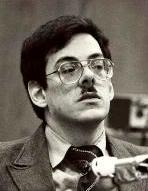 LUCASVILLE, Ohio (AP) -- Ohio executed a neo-Nazi Thursday who shot two men and a teen to death at Cleveland State University more than a quarter-century ago in a shooting spree that targeted blacks.
LUCASVILLE, Ohio (AP) -- Ohio executed a neo-Nazi Thursday who shot two men and a teen to death at Cleveland State University more than a quarter-century ago in a shooting spree that targeted blacks.
Frank Spisak, who read Bible verses in German for a final statement, was pronounced dead at 10:34 a.m. after an injection of sodium thiopental at the Southern Ohio Correctional Facility.
Spisak, 59, is expected to be the last Ohio inmate to die by sodium thiopental, the scarce drug the state is giving up in favor of a more readily available substitute.
Spisak also set the Ohio record for the longest time on death row before execution, at more than 27 years.
Spisak blamed the 1982 shootings on a hatred of gays, blacks and Jews and on a mental illness related to sexual identity confusion. Spisak has identified as a woman and in correspondence by the name Frances Spisak, a name that defense attorneys also used.
Spisak read the first seven Bible verses in Chapter 7 of the book of Revelation from a handwritten yellow paper held overhead by a prison official, speaking in a halting voice and sometimes having trouble reading the verses.
``Heil Herr,'' Spisak appeared to say when finished. The phrase is not used in German, and Spisak's meaning was unclear.
The killer stopped reading one verse short of a verse that refers to murderers and other wrongdoers being punished.
Spisak's struggles with German drew snickers from witnesses.
``Speak English, you fool,'' said Jeffrey Duke, the brother of slaying victim Brian Warford.
Warford was black, as was Spisak's first victim, Rev. Horace Rickerson.
Last month, attorneys asked the Ohio Parole Board to spare Spisak's life, saying their client suffers from a severe bipolar disorder that was not diagnosed until years after the conviction.
Spisak continued to take medication until the end, receiving 300 milligrams of Lithium at 6:44 a.m., according to prison records.
But both the parole board and Gov. John Kasich, making his first decision on a condemned killer's request for mercy, rejected Spisak's plea.
Warford was taking classes at Cleveland State as an alternative education student earning his high school degree when he was shot and killed in 1982.
Rickerson, 57, was killed Feb. 1 in a campus bathroom where he had rebuffed Spisak's sexual advances. The following Aug. 27, Timothy Sheehan, 50, a white man who worked in Cleveland State's maintenance department, was killed because Spisak believed Sheehan might have witnessed Rickerson's shooting.
Hardaway was shot seven times as he waited for a commuter train by a man later identified as Spisak. He survived and had planned to witness the execution. On Aug. 9, 1982, Coletta Dartt, a white university employee, was shot at as she exited a bathroom stall. She pushed Spisak away and ran.
Spisak was caught in early September 1982 after firing a gun out of an apartment window. Spisak told investigators of ``hunting parties'' to shoot black people.
Spisak grew a Hitler-style mustache during the 1983 trial, carried a copy of Hitler's book ``Mein Kampf'' and gave the Nazi salute to the jury.
After prison warden Donald Morgan signaled to start the sodium thiopental Thursday morning, Spisak's abdomen rose and fell a few times, and several snoring sounds were made after a minute. Spisak swallowed a few times and grew still around 10:25 a.m.
``Oh God,'' Eric Barnes, another of Warford's brothers, said as Spisak died.
Barnes held photographs toward Spisak showing Warford as a baby and a teen, and held a crucifix as Spisak read the Bible verses.
Spisak glanced at Warford's brothers while strapped to the gurney, then looked away.
Warford's mother, Cora Warford, said in a statement afterward that ``justice has been served.''
Sheehan's family praised the justice system.
``Today, we chose to celebrate the life of husband and father, Timothy Sheehan, not the death of Frank Spisak,'' the statement said.
Spisak's attorneys, who watched the execution, issued a statement saying Spisak committed crimes because of severe mental illness, not out of hate.
``We have the ability to provide treatment and protect the public without killing mentally ill people who commit crimes,'' said Alan Rossman and Michael Benz.
The U.S. Supreme Court had rejected a final appeal late Wednesday, in which Spisak asked for a delay so he could argue the death penalty's constitutionality based on recent comments by a state Supreme Court justice criticizing capital punishment in Ohio.
- Home
- News
- Opinion
- Entertainment
- Classified
- About Us
 MLK Breakfast
MLK Breakfast- Community
- Foundation
- Obituaries
- Donate
04-18-2024 3:43 am • PDX and SEA Weather






















































































































































































































































































































